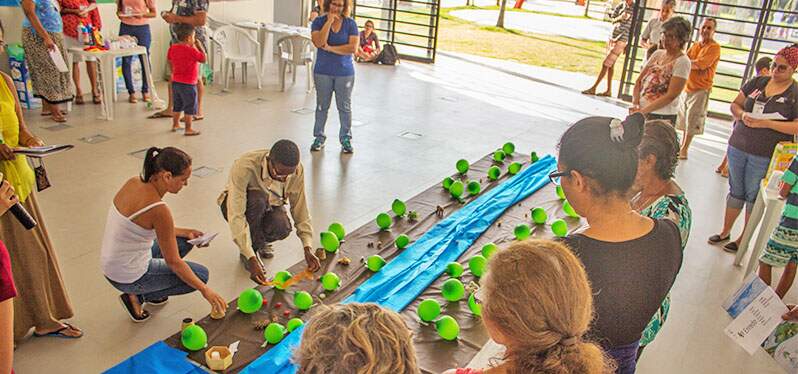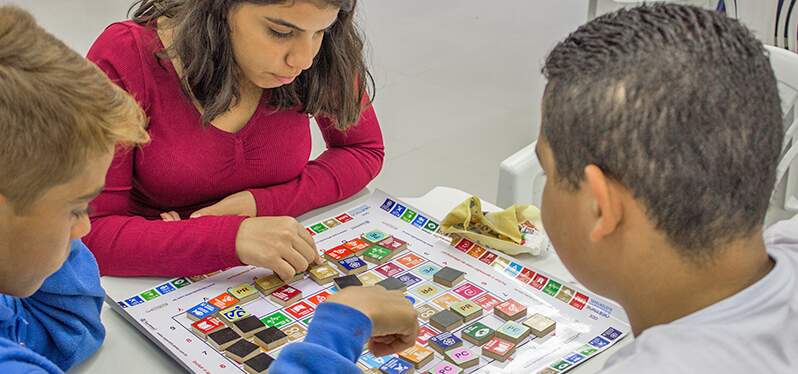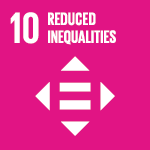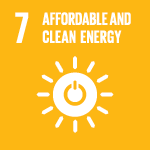Posted in: 12/16/2021
Environmental Education (EA) in the context of Licensing is understood as a tool for environmental management and, therefore, is in the realm of non-formal education. It does not follow the curricular parameters set by the MEC, but acts in consonance with them for a good implementation of the Environmental Education pedagogical practices.
We can say that in Environmental Licensing there is a space of tension between public and private interests, which makes this instrument relevant in the National Environmental Policy, especially when it comes to participation and social control.
In methodological terms, different political-pedagogical macro-tendencies of contemporary Environmental Education can be identified. According to Layrargues (2011), in Brazil we can classify, in general lines, Environmental Education in three strands: conservative, pragmatic and critical. Even though it is known that, in reality, the strands do not have such rigid boundaries.
The conservative one is based on the appreciation of the affective dimension in relation to nature and on the change of individual behaviors in relation to the environment. Pragmatics stands for sustainable development and consumption, focusing on depleting natural resources and alluding to the fight against waste.
Finally, the third – the critical– seeks the political confrontation of environmental inequalities and injustices. Equally, this strand problematizes the contradictions of the current mode of production and its economic and political development, introducing into society the debate of citizenship, democracy, participation, human emancipation, and social transformation.
The latter is materialized through environmental protection laws, as, for example, in the case of the legislation of the State of Minas Gerais, which in the Normative Deliberation DN COPAM nr. 238/2020, in its Art. 2, defines Environmental Education as
“a permanent teaching-learning process with a systemic approach, which recognizes the set of interrelations between natural, cultural, historical, social, economic, and political spheres, with the purpose of allowing the social groups involved in the enterprise to acquire knowledge, skills, and attitudes for empowerment and full exercise of citizenship”.(emphasis added)
One notices that, in the legal context, EA is presented as a process, that is, a means that aims at the social groups involved in the enterprises to fully exercise their citizenship.
The full exercise of citizenship is closely related to the awareness of rights and duties by the citizens, and is closely related to the struggles for them to be effectively fulfilled, and not just guaranteed by law. One of the main goals of a country’s education must be to prepare people for the full exercise of citizenship, whether in formal or non-formal education.

Consulting firms, such as Synergia, which operate in the environmental education market depending on the legal context that occurs in the context of environmental licensing, should keep in mind that the role that the environmental educator plays exalts its importance with social work, which can contribute to the management of conflicts of use and impacts caused by a project, aiming to ensure:
While informal education the collective teaching-learning spaces are almost “natural“, assuming that the interactions take place through direct contact between people in classrooms and auditoriums, in non-formal education it can happen in classrooms as well as in sheds, offices, workshops, and even under trees or over wood stoves.
More recently, the use of remote interaction technologies for performing activities has become indispensable. Thus, the use of participative tools, via the Internet, has made it possible not only to overcome the distance barrier, but also, in many cases, to facilitate some interactions that were sometimes costly. This has streamlined processes and reduced costs, without affecting the quality of the information. On the contrary, it has created more effective ways of generating records and controls, such as recordings of the events and interactive platforms, adaptable to the usual face-to-face pedagogical methodologies and practices. But these virtual learning spaces also bring with them limitations that need to be identified and overcome.
In more general lines, it can be said that to achieve active participation during the pedagogical practices of Environmental Education, and an emancipatory education, it is necessary to know the reality of each territory and its communities in order to compose an action plan that speaks to the identified problems that allow implementation for that particular ecosystem, community, political situation, etc.
Therefore, a methodological approach to environmental education consolidation integrates a mobilization strategy with territorial recognition and continuous engagement and with the structuring of participatory diagnoses, action plans for program definition and execution and monitoring to ensure improvements in the promotion of environmental conservation and the ethical-political recognition of the subject.
There are several application tools for composing this methodological approach, either face-to-face or remote. We highlight some that were used by Synergia’s team in their approaches in the communities they served. They are:


We are aware of the difficulties and challenges that environmental educators face in the implementation of pedagogical practices of Environmental Education and Environmental Education Programs in licensing contexts, because at the same time that they are consultants they are also executors of the actions as representatives of the companies, which also respond to the conditions set by public agencies. This often prevents the emancipatory character of the educational process from being pursued.
But it is important to remember that Environmental Education in this context should not be exhausted in its administrative and technical dimensions, but should take into account the political and economic relations that situate the educators’ own technical choices. Therefore, even when in limited conditions, it is advisable not to distance ourselves from having an ethical position, agreeing on decisions with the companies.
Furthermore, we are aware that Environmental Education, alone, will not drive sustainable development, nor does it even have the ambition to end social inequality. However, the EA that we believe we practice within Synergia is intended to be an instrument of access to information and knowledge qualification, so that communities and companies understand their role in relation to the environment and understand how fundamental the processes that involve the preservation and restoration of nature are.
*Synergia has a Nucleus of Educators dedicated especially to the themes of Social and Environmental Education, always attentive to the development of new methods and approaches that bring knowledge and effective learning to our territories of operation. The Center’s staff prepared this article seeking to clarify for our readers the context and relevance of Environmental Education in contemporary society.
The article “The pedagogical practices of Environmental Education and the political and methodological context” is the last of a series of 3 texts produced by the Center.
Check out the two previously published articles:



Sign up and receive our news.